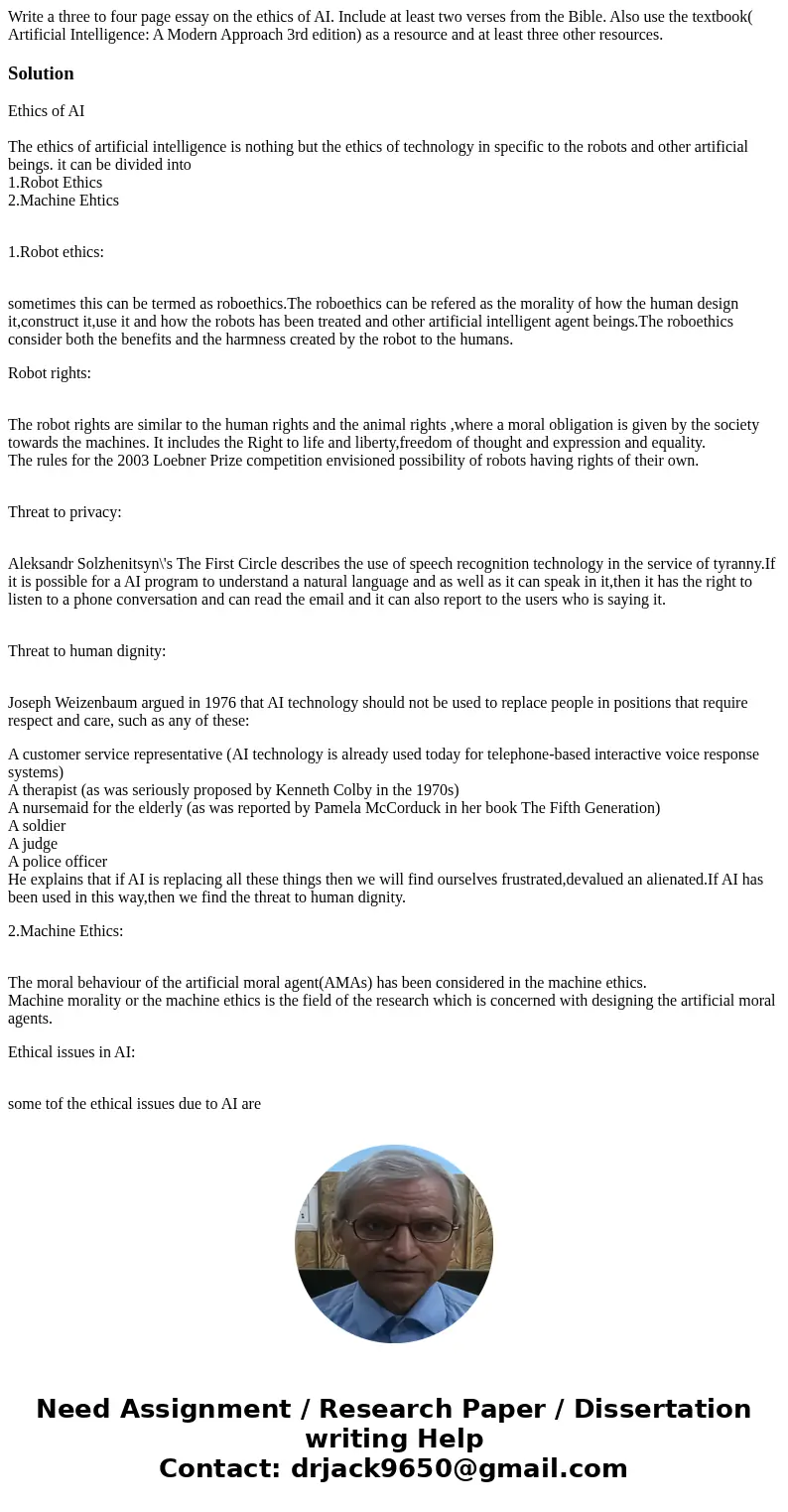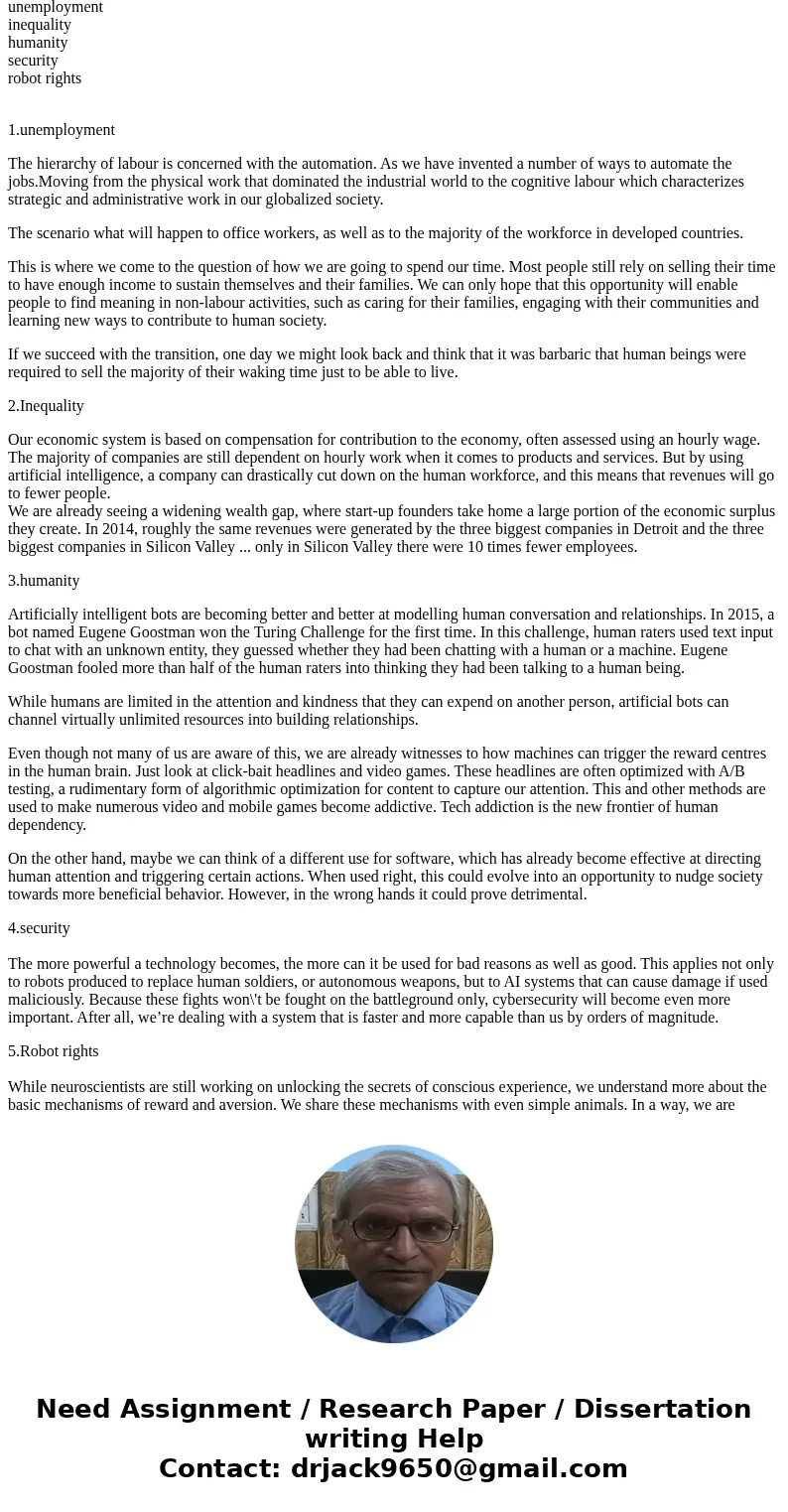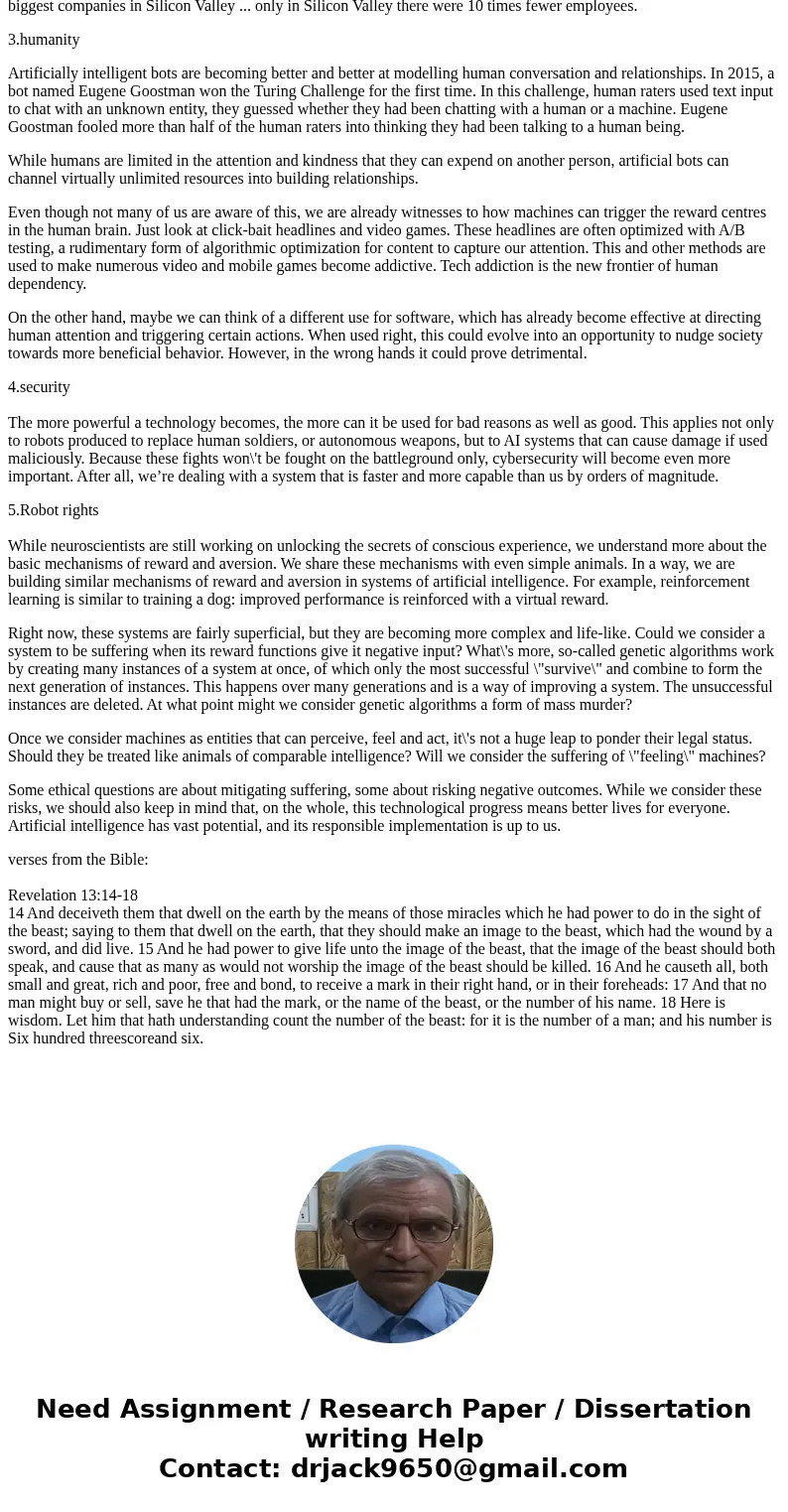Write a three to four page essay on the ethics of AI Include
Write a three to four page essay on the ethics of AI. Include at least two verses from the Bible. Also use the textbook( Artificial Intelligence: A Modern Approach 3rd edition) as a resource and at least three other resources.
Solution
Ethics of AI
The ethics of artificial intelligence is nothing but the ethics of technology in specific to the robots and other artificial beings. it can be divided into
1.Robot Ethics
2.Machine Ehtics
1.Robot ethics:
sometimes this can be termed as roboethics.The roboethics can be refered as the morality of how the human design it,construct it,use it and how the robots has been treated and other artificial intelligent agent beings.The roboethics consider both the benefits and the harmness created by the robot to the humans.
Robot rights:
The robot rights are similar to the human rights and the animal rights ,where a moral obligation is given by the society towards the machines. It includes the Right to life and liberty,freedom of thought and expression and equality.
The rules for the 2003 Loebner Prize competition envisioned possibility of robots having rights of their own.
Threat to privacy:
Aleksandr Solzhenitsyn\'s The First Circle describes the use of speech recognition technology in the service of tyranny.If it is possible for a AI program to understand a natural language and as well as it can speak in it,then it has the right to listen to a phone conversation and can read the email and it can also report to the users who is saying it.
Threat to human dignity:
Joseph Weizenbaum argued in 1976 that AI technology should not be used to replace people in positions that require respect and care, such as any of these:
A customer service representative (AI technology is already used today for telephone-based interactive voice response systems)
A therapist (as was seriously proposed by Kenneth Colby in the 1970s)
A nursemaid for the elderly (as was reported by Pamela McCorduck in her book The Fifth Generation)
A soldier
A judge
A police officer
He explains that if AI is replacing all these things then we will find ourselves frustrated,devalued an alienated.If AI has been used in this way,then we find the threat to human dignity.
2.Machine Ethics:
The moral behaviour of the artificial moral agent(AMAs) has been considered in the machine ethics.
Machine morality or the machine ethics is the field of the research which is concerned with designing the artificial moral agents.
Ethical issues in AI:
some tof the ethical issues due to AI are
unemployment
inequality
humanity
security
robot rights
1.unemployment
The hierarchy of labour is concerned with the automation. As we have invented a number of ways to automate the jobs.Moving from the physical work that dominated the industrial world to the cognitive labour which characterizes strategic and administrative work in our globalized society.
The scenario what will happen to office workers, as well as to the majority of the workforce in developed countries.
This is where we come to the question of how we are going to spend our time. Most people still rely on selling their time to have enough income to sustain themselves and their families. We can only hope that this opportunity will enable people to find meaning in non-labour activities, such as caring for their families, engaging with their communities and learning new ways to contribute to human society.
If we succeed with the transition, one day we might look back and think that it was barbaric that human beings were required to sell the majority of their waking time just to be able to live.
2.Inequality
Our economic system is based on compensation for contribution to the economy, often assessed using an hourly wage. The majority of companies are still dependent on hourly work when it comes to products and services. But by using artificial intelligence, a company can drastically cut down on the human workforce, and this means that revenues will go to fewer people.
We are already seeing a widening wealth gap, where start-up founders take home a large portion of the economic surplus they create. In 2014, roughly the same revenues were generated by the three biggest companies in Detroit and the three biggest companies in Silicon Valley ... only in Silicon Valley there were 10 times fewer employees.
3.humanity
Artificially intelligent bots are becoming better and better at modelling human conversation and relationships. In 2015, a bot named Eugene Goostman won the Turing Challenge for the first time. In this challenge, human raters used text input to chat with an unknown entity, they guessed whether they had been chatting with a human or a machine. Eugene Goostman fooled more than half of the human raters into thinking they had been talking to a human being.
While humans are limited in the attention and kindness that they can expend on another person, artificial bots can channel virtually unlimited resources into building relationships.
Even though not many of us are aware of this, we are already witnesses to how machines can trigger the reward centres in the human brain. Just look at click-bait headlines and video games. These headlines are often optimized with A/B testing, a rudimentary form of algorithmic optimization for content to capture our attention. This and other methods are used to make numerous video and mobile games become addictive. Tech addiction is the new frontier of human dependency.
On the other hand, maybe we can think of a different use for software, which has already become effective at directing human attention and triggering certain actions. When used right, this could evolve into an opportunity to nudge society towards more beneficial behavior. However, in the wrong hands it could prove detrimental.
4.security
The more powerful a technology becomes, the more can it be used for bad reasons as well as good. This applies not only to robots produced to replace human soldiers, or autonomous weapons, but to AI systems that can cause damage if used maliciously. Because these fights won\'t be fought on the battleground only, cybersecurity will become even more important. After all, we’re dealing with a system that is faster and more capable than us by orders of magnitude.
5.Robot rights
While neuroscientists are still working on unlocking the secrets of conscious experience, we understand more about the basic mechanisms of reward and aversion. We share these mechanisms with even simple animals. In a way, we are building similar mechanisms of reward and aversion in systems of artificial intelligence. For example, reinforcement learning is similar to training a dog: improved performance is reinforced with a virtual reward.
Right now, these systems are fairly superficial, but they are becoming more complex and life-like. Could we consider a system to be suffering when its reward functions give it negative input? What\'s more, so-called genetic algorithms work by creating many instances of a system at once, of which only the most successful \"survive\" and combine to form the next generation of instances. This happens over many generations and is a way of improving a system. The unsuccessful instances are deleted. At what point might we consider genetic algorithms a form of mass murder?
Once we consider machines as entities that can perceive, feel and act, it\'s not a huge leap to ponder their legal status. Should they be treated like animals of comparable intelligence? Will we consider the suffering of \"feeling\" machines?
Some ethical questions are about mitigating suffering, some about risking negative outcomes. While we consider these risks, we should also keep in mind that, on the whole, this technological progress means better lives for everyone. Artificial intelligence has vast potential, and its responsible implementation is up to us.
verses from the Bible:
Revelation 13:14-18
14 And deceiveth them that dwell on the earth by the means of those miracles which he had power to do in the sight of the beast; saying to them that dwell on the earth, that they should make an image to the beast, which had the wound by a sword, and did live. 15 And he had power to give life unto the image of the beast, that the image of the beast should both speak, and cause that as many as would not worship the image of the beast should be killed. 16 And he causeth all, both small and great, rich and poor, free and bond, to receive a mark in their right hand, or in their foreheads: 17 And that no man might buy or sell, save he that had the mark, or the name of the beast, or the number of his name. 18 Here is wisdom. Let him that hath understanding count the number of the beast: for it is the number of a man; and his number is Six hundred threescoreand six.



 Homework Sourse
Homework Sourse